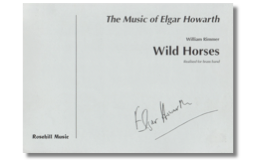Results
-
Badinerie Swings - Len Jenkins - Len Jenkins
Featuring the Eb Soprano Cornet, this 'show-off' piece is based on movement VII of Suite No. 2 for Flute and String Orchestra by J S Bach. Originally written in B minor, it has been transposed to suit the range of normal brass instruments and it is trusted that Bach 'purists' will appreciate this adaptation along with the swing section which may be omitted if desired.
-
 £39.95
£39.95Wild Horses (Score and Parts) - William Rimmer Realised by Elgar Howarth
Taken from William Rimmer's The Artistic Soloist - a volume of character melodies for solo cornet - Elgar Howarth has furnished four of the tunes with full accompaniment for brass band. Wind Horses demands a firm straight delivery of the tongue and a steady tempo with a full sound throughout, although the trio section is more flexible.
Estimated dispatch 7-9 working days
-
£40.00
Blue Sleeve Step - Harper, P
This is a big band style number which is modelled on Barrie Gott's brilliant Lightwalk. It begins with a walking bass before horns state the highly whistleable tune for the first time. The full band quickly joins and there is an extended solo break for cornet. A tiptoeing tuba solo precedes the final key change which propels the piece to its infectiously foot-tapping conclusion.2nd section +
In Stock: Estimated dispatch 1-3 working days
-
£45.00
Caribe - Camilo, M - Harper, P
An absolute showstopper in Latin style, this features solos for horn, baritone and cornet, amongst others. Simplified lines are also offered, but the full effect can be heard on Cory Band's CD Summon the HeroesChampionship sectionDuration 3 mins 30 secsListen to Cory Band on 'Summon the Heroes'Courtesy of World of Brass
In Stock: Estimated dispatch 1-3 working days
-
£40.00
Clans Collide - Harper, P
An antiphonal piece pitting two teams against each other in a musical battle led by soprano cornet on one side, and trombone on the other. The music is duel-like and virtuosic and blood will be spilled!Championship sectionDuration 4 mins
In Stock: Estimated dispatch 1-3 working days
-
£35.00
Climb Ev'ry Mountain from Sound of Music - Rodgers & Hammerstein - Harper, P
Hit from The Sound of Music, features for solo horn, euphonium (or vocal line - words included) and optionally soprano cornet with 'McArthur Park' style end. Starts quietly with a single voice (horn) and grows in power throughout.3rd section +Duration 4 minsListen to Cory BandCourtesy of World of Brass
In Stock: Estimated dispatch 1-3 working days
-
£45.00
Hymn to the Cross - Lane, L
This beautiful, reflective piece is filmic and expansive, portraying hope in the midst of the bleak scenario of the Korean War. Features lyrical soloists throughout and an offstage Last Post ending for cornet.2nd Section +Duration 4 minsClick to Listen - Courtesy of Cory Band
In Stock: Estimated dispatch 1-3 working days
-
£40.00
I've Gotta Be Me - Marks, W - Harper, P
Your next band finale? This famous arrangement of a Sammy Davis Jnr hit starts with a solitary cornet solo and builds in momentum to a contagious, drum-driven blockbusting ending.1st section +Duration 4
In Stock: Estimated dispatch 1-3 working days
-
£35.00
Lament - Harper, P
This simple but effective piece tugs at the heartstrings in its stark but beautiful portrayal of sadness. Features flugel, cornet and euphonium1st sectionDuration 3 mins
In Stock: Estimated dispatch 1-3 working days
-
£35.00
Mood Indigo - Ellington, Duke - Harper, P
One of the Duke's most famous songs, this extremely subdued arrangement features a laid-back cornet solo, a whispering flugel solo, and then a big surprise for your audience in the middle. As played by Cory Band at Brass in Concert 2017.3rd section +Duration 3.30 minsListen to Cory Band on BIC 2017Courtesy of World of Brass
In Stock: Estimated dispatch 1-3 working days
